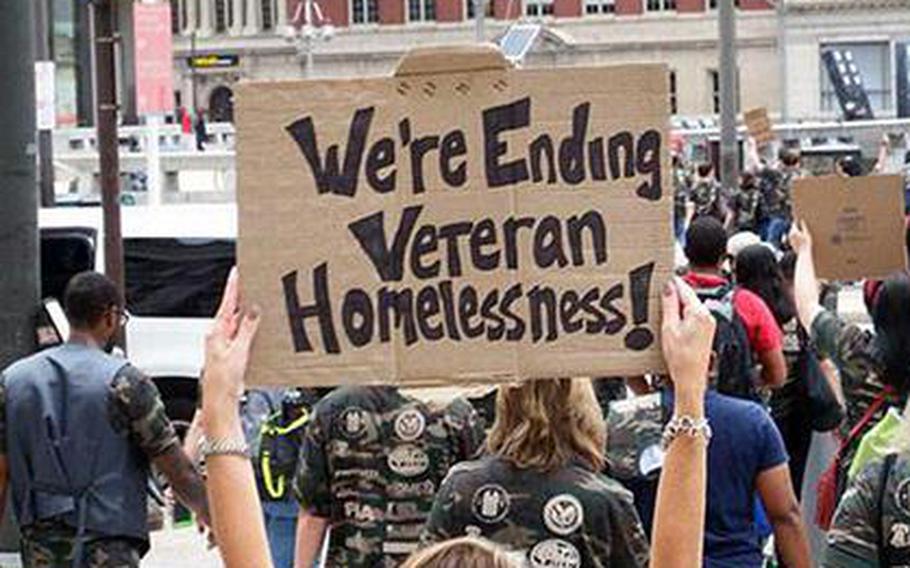
The annual one-night, nationwide count of homeless conducted by the Department of Housing and Urban Development is failing to capture the scope of the problem, including among veterans, House lawmakers said June 27, 2024. (VA.gov)
WASHINGTON — The annual one-night, nationwide count of homeless conducted by the Department of Housing and Urban Development is failing to capture the scope of the problem, including among veterans, House lawmakers said Thursday.
The point-in-time census conducted in January 2023 seemed to under-represent homeless veterans at 36,000 when 300,000 veterans each year access homeless services through the Department of Veterans Affairs, Rep. Michael Levin, D-Calif., said during a hearing of the House Veterans’ Affairs Committee subpanel on economic opportunity.
The hearing was held to look at ways that real-time data could be applied to identify and track veterans experiencing homelessness and provide them housing and other services more quickly.
But lawmakers also discussed problems with HUD’s point-in-time census that relies on volunteers to conduct head counts of people living on the streets or staying in emergency shelters during one night in January.
Homeless advocates have said the count fails to reach homeless people living in cars, staying with friends or trying to keep out of sight. The National Law Center on Homelessness and Poverty described the count as severely flawed.
“It’s important that we get the numbers right, as we consider public policy. We play from the same data set,” Levin said. “Each January, there is a point-in-time count that identifies the number of homeless veterans. But it is an imperfect picture of reality.”
Rep. Derrick Van Orden, R-Wis., the subcommittee chairman, questioned VA officials about how the $3.2 billion budget to address homeless veterans is being used and why that level of spending is not more effective.
“This subcommittee needs a better picture from the VA about the actual issues veterans are facing. We’ve got to focus on the root cause of homelessness. Doing this will keep veterans off the streets, save the taxpayer money — and save lives,” he said.
Thomas O’Toole, deputy assistant undersecretary for health and clinical services at the Veterans Health Administration, said the $3.2 billion reflects VA’s large scope of services to address homelessness. The budget funds housing, mental health counseling, addiction treatment, job training and many other services, he said.
“It is a generous budget and we’re appreciative of congressional support,” O’Toole said. “Our job is to help veterans who are homeless and prevent individuals from becoming homeless, move them into housing and keep them there with the necessary supports and care.”
Van Orden also urged the VA to look at alternative community models that are yielding results, including “by-name lists” that electronically track veterans who are homeless to ensure they get services, one-stop shops that enable veterans to get most services at a single location, and faith-based programs that help heal the psychological wounds of combat.
Jeff Olivet directs the U.S. Interagency Council on Homelessness, the sole federal agency with a mission to end homelessness. Olivet told lawmakers that Dallas recently joined 83 other U.S. communities to “declare a functional end to veteran homelessness.”
The city has committed to placing any veteran who becomes homeless into permanent housing within 90 days, according to city leaders.
Van Orden said it is important for the subcommittee to hear about best practices adopted in Dallas and other communities for securing permanent housing for veterans.
Rosanne Haggerty, president of Community Solutions, discussed her company’s development of electronic “by-name lists,” which she described as person-specific data that is tracked to give communities a better understanding of homelessness.
Her nonprofit company provides a homeless management information system, which is a database that enables communities to identify people by name who are homeless and understand where and how they receive local services.
Communities use the software to identify everyone who is homeless and “support them from first contact all the way to achieving permanent stable housing,” according to the company’s website.
“The key to this methodology is the creation of a comprehensive by-name, real-time list of each person experiencing homelessness in that community. Real-time, by-name data has proven to be a game-changer for every type of community working to end veteran homelessness,” Haggerty said.
She said communities use the information to identify problems a veteran might be experiencing, coordinate services, follow progress and “course correct as needed.”
Haggerty said personalized tracking of veterans facilitates the delivery of services and speeds up getting them housing.
Van Orden urged lawmakers to consider a variety of ways for addressing veteran homelessness. He said he benefited from a faith-based program for veterans after serving in the military for 26 years, including as a Navy SEAL.
“If the VA is not taking in and considering all solutions, then they are sticking with modalities that have proven to be not effective, so let’s do something different,” Van Orden said.